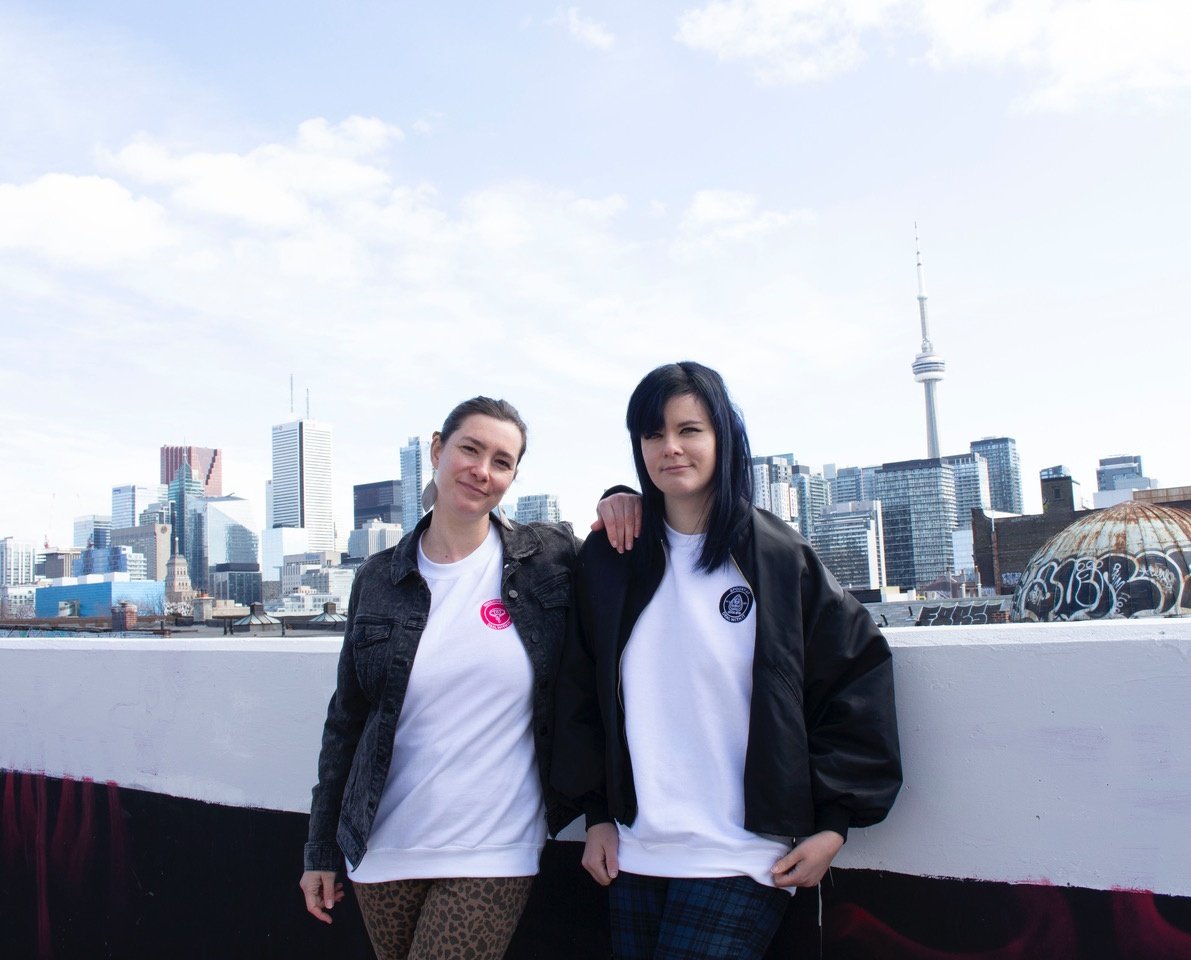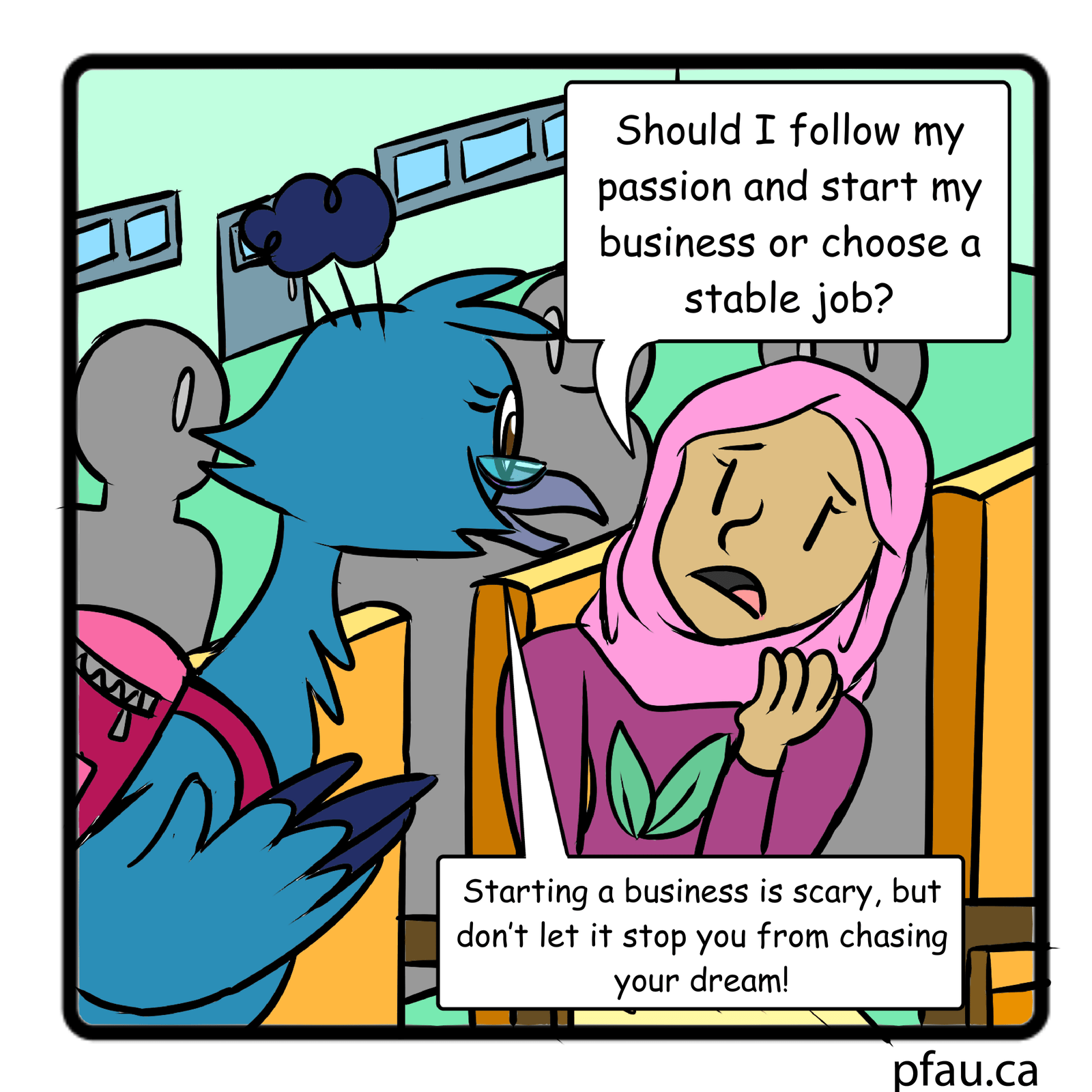We interviewed Penelope and Mary, two sisters on a mission to create empowering relatable designs that highlight social issues, about starting your own business without a business degree. The professional world isn’t exactly the same as generations before us. People change careers often, work multiple jobs or gigs, and often prefer to work for themselves than a large established corporation. Long gone is the dream (or reality) of working the same job until retirement. So, we thought it would be interesting for students and recent grads to learn about young adults who have started some creative and meaningful businesses.

Penelope and Mary showcase their meaningful designs on an array of clothing and accessories. They also try to do their part to give back to the community by donating a portion of their profits to non-profits that represent their personal and professional values. They are the epitome of a socially conscious business. Ultimately, Penelope and Mary’s goal is to make people feel good about themselves and brave enough to shed light on some really important issues.
_
How do you think your creative educational backgrounds and your own kind of work experience have helped you as you ventured into the world of entrepreneurship?
_
Penelope: I am a believer that all of our skills are transferable in many ways. For my undergrad degree, I majored in film studies, and then I did a diploma in social work. Two, what seems to be different avenues, really required a lot of the same type of skills such as: perception, communication, seeing things that are not necessarily right in your face. For example, when you are making or studying a film, you are analyzing it, breaking it down, looking at the story that is being told, learning about the characters… Films are such a beautiful medium for storytelling, and to also create social change. Learning how these types of mediums can tell stories that can change people’s lives and shed light on a lot of topics was the one thing I really took away from my Film degree. With my experience in social work, I learned all about looking at the world as a whole and lifting the veil to seeing it through a lens of understanding of issues like white privilege, and oppression. These experiences really opened my mind. Now, I am taking all of that and putting it into this business in terms of our concept and what we are trying to achieve with this business. We strive to become a socially responsible and conscious business.
Mary: It is a little more obvious how my background would help out this business. I have always loved to draw and it is something that I have been doing since I can remember. Naturally, I became an artist and decided to learn about graphic design. With graphic design, I had to come up with designs all the time. I had to always come up with different concepts and learning to design different things, such as posters, websites, and photographs. All these things that I learned in school, I have tied into this business. I have taken those creative and designing tools and applied them directly to our products. My educational background has been a huge impact on our business.
_
What would you tell your 25-year-old selves, who are thinking of starting a business in the next few years? What kind of warnings or tips would you give them?
Mary: I would tell my younger self to not be overly confident. Do not go into this thinking that things need to fall into place right away. Do not assume that things need to work out right away for things to be successful. Everything takes time. Even now we are still growing and learning and we are still not at the point where we want to be yet. When we first started this whole business, I was under the assumption that I am pretty good at designing, so we are gonna get sales, and everything is going to work out perfectly. However, that has not been the case. That has been a learning experience to be patient and just keep going. Sometimes, you have to let go of expectations. Do not give up and things will slowly get better.
Penelope: Personally, I think one of the challenges of starting a business is not necessarily the process of starting it, but rather figuring out how it is going to evolve and your vision for the business. What direction do you want it to go? This question can be hard because you may have a really good idea, but not really know what the vision is like. Even if you have a vision, there is a lot of stuff you are not going to think about or know. You have to learn a lot of new things and skills and everything takes time. As Mary said, you cannot just go into it expecting to make money right away or get sales right away because it is not going to happen. You have to build up to that.
Tell us a little bit about the values in your business. Where does the inspiration come from?
Penelope: Empowerment is like, a major one for us. We want our design to make people feel good about themselves. We want our designs to make people feel seen, Mary and I have often felt very misunderstood throughout our lives. Personally, I felt like a very misunderstood person most of my life. I felt like an outsider who did not always fit in. We just really want our designs to reach out to people that do not feel like they are important or special, or that they matter. For example, our AF collection, such as Queer AF, Sensitive AF was actually my idea. I have felt ashamed my whole life for how sensitive I am and I want to reach out to people who have felt ashamed for being who they truly are, and let them know that they should not feel that way. A lot of our values come from our hearts and personal experiences. We aim to create something that it speaks to people. It is always about love, acceptance, inclusivity, and empowerment.
Mary: My answer would be really similar to what Penelope said. Through our designs, we try to make people feel relatable. For example, I identify as pansexual, so that is why we have the queer design. I know how hard it is to come to terms with who you are and even now I am still discovering myself more and more as I get older. All of our designs are a piece of us. It all comes from personal stories, our personal journey or those close to us and their journey. We are always just trying to make everything really authentic. Thinking about the keywords about our values, another one would be kindness. Treating people with kindness is highly valued for us in a world where everyone is so competitive. For women, especially, sometimes we feel not enough: not pretty enough, not smart enough, or not doing enough. As a result, we want to speak on that issue through our designs and a big part of our focus is on female empowerment.
Book Recommendations
A Piece of Cake: A Memoir by Cupcake Brown
She Comes Undone by Wally lamb
_
_
Thank you, Mary and Penelope, for sharing the excellent advice with us and our readers!
_
Missed the podcast? Listen here:
_
_
For more advice about writing, check out our weekly podcast or subscribe to our monthly newsletter.
_
To get more help with your assignments, book a 20 minute discovery session with us and start your journey to reaching your full potential on the page, and in life.
Both the written, visual, audio, and audiovisual content of this post has been created by and is the intellectual property of Lisa Pfau and PFAU Academic Writing. Please do not replicate any of the above content without our consent. However, please do feel free to share this post and its authorship widely.





